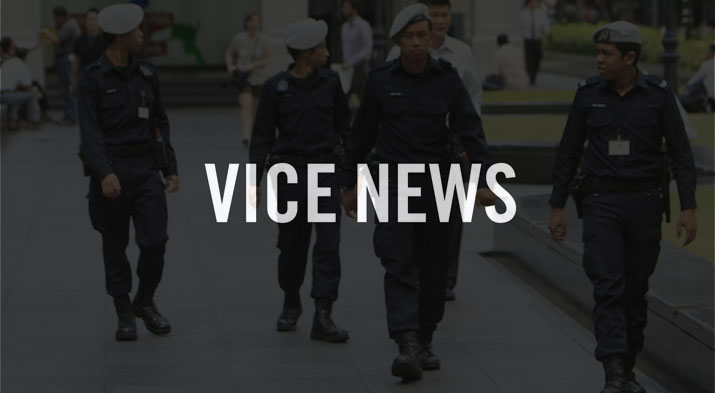In a move to show that they are cool, flippant and edgy, Vice News -- a news channel that reports on under-reported international issues targeting millennials who like cool, flippant and edgy posturing -- has repeatedly referred to Singapore's English broadsheet The Straits Times as "The Straights Times", in its latest article on the arrest and detention of two youths suspected of terrorism-linked activities.
The article, "Singapore Uses Jihadist Rehab to Justify Indefinite Detention of 'Self-Radicalized' Teen", published on May 28, 2015, also makes it clear they don't stand for detentions without trial and finds the act of rehabilitating those detained unconscionable.
This is the opening two paragraphs and note the word "Yet" in the second paragraph:
Authorities in Singapore knew M Arifil Azim Putra Norja'I was an impressionable young man. They had been monitoring the 19-year-old for some time, after someone tipped off the Ministry of Home Affairs (MHA) about his increasingly erratic behavior. The MHA found digital traces dating back to 2013 of blueprints for homemade IEDs, searches on the best way to travel to Syria, and multiple views of Islamic State-linked propaganda.
Yet, after Arifil allegedly became the first known "self-radicalized" Singaporean with plans to join the Islamic State (IS), officials took the post-secondary student into custody under a state security law that allows the government to hold suspects in "preventative detention" for two years without trial.
But that's pretty much it.
They didn't get any further other than interviewing Rohan Gunaratna, head of the International Centre for Political Violence and Terrorism Research at Singapore's Nanyang Technology University, to talk about the Singapore government's justifications for lengthy detentions under the Internal Security Act, how rehabilitation and detainee reviews in Singapore are kind of similar to those undertaken at Guantanamo Bay, Cuba and other US prisons (which are supposedly shrouded in secrecy or not well-publicised), and briefly mentioning, in dribs and drabs (notice the word "Yet" being used again), Singapore's ISA past:
Yet critics argue that detention without trial under the ISA violates international human rights. Amnesty International claims officials have also detained people for more than the city-state's legally prescribed time — sometimes for nine years or longer. Another former detainee, Teo Soh Lung, detailed her detentions in 1987 and 1990 in a book. Her experiences differed vastly from Harith's description. Teo, an activist and lawyer, became known as a prisoner of conscience after her detention. She was one of 16 accused of being part of a "Marxist plot" for working with the opposition party during an election.
And this is what local readers can conclude: This type of trying to be critical reporting but lacking in harder-hitting criticism can be interpreted as either being wish-washy at best, or at worst, a foreigner who obviously doesn't know the subject of Singapore very well dabbling in a bit of writing to appear cool, flippant and edgy.
No wonder this is the type of posturing that passes off as news targeting the millennials.
If you like what you read, follow us on Facebook and Twitter to get the latest updates.
If you like what you read, follow us on Facebook, Instagram, Twitter and Telegram to get the latest updates.
